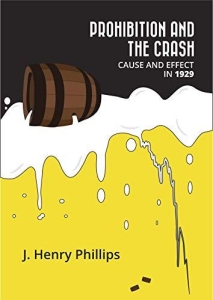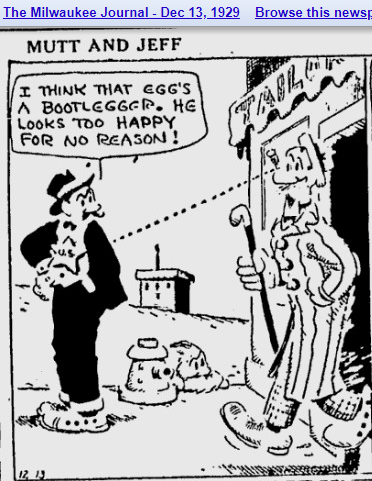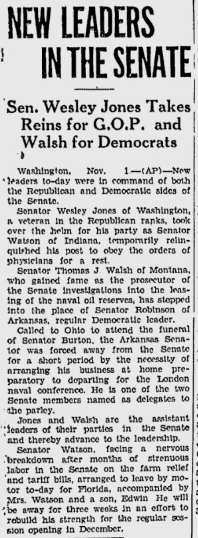Republicans and their Democratic abettors pretended the 1920-22 Crash and Depression were happenstance—nothing whatsoever to do with a Constitutional Amendment ending the freedom of trade and production. Those closest to the public–smugglers and bootleggers–simply ignored the dry laws, and paid cops, agents, prosecutors, inspectors and judges to help them ignore them. Freedom from coercion was bought and sold like any other commodity in a mixed-economy market.
Realists understood perfectly that coercive meddling had precipitated the Crash and plunged the nation into a Depression at the onset of Constitutional Prohibition. And sure enough, nullification of the dry looters’ laws enabled the economy to recover in fairly short order. But God’s Own Prohibitionists were far from pleased. The Great Unwashed was treating them with the sort of irreverence Andrew Jackson had displayed toward the Supreme Court’s Chief Justice: “Now let’s see him enforce it.”
Battalions of brutes with service pistols and political will could, they imagined, secure “real” prohibition enforcement. Sheer murderous mobilization had, after all, served to Hooverize and throttle the Accursed Hun in 1918, had it not? So the Jones Five and Ten Law was handed to Herbert Hoover to wield as bludgeon, bayonet and blackjack. Former prosecutor Willebrandt published the complete arsenal of government weaponization in a book-length column in August and September in some 2 dozen papers, and the economy went from recovering to ruined in 12 weeks.
Suddenly, amid the wreckage of the Crash, Senator Jones Law Jones–the very incarnation of the Methodist White Terror–was running the G.O.P. Senator Robinson, remanded to the Sahara of the Bozarts, was replaced at the Dem helm by impecunious-immigrant-turned-gold-magnate Walsh. Walsh was father of Evalyn “Hope Diamond” Walsh McLean, a hard-drinking morphine addict once best friends with the Late President Warren Harding, and married to Edward McLean, newspaper magnate nearly arrested for lying to protect a former cabinet officer in the Teapot Dome.
Events in 1987 followed the same pattern. Mystical prohibitionism ramped up until the economy crashed in 1987, then retrenched with increasing fanaticism until voters had no choice but to throw the bastards out.

Prohibition kills economy; government adds MORE prohibition! (link)
The article says:
WASHINGTON (AP) – faced with a revolt by conservatives, congressional leaders attached anti-obscenity provisions to a compromise drug bill so the measure can pass and the 100th Congress can go home.
A weary House Speaker Jim Wright predicted Thursday night that both houses would approve the leaders’ “final agreement” on the drug bill today, but cautioned that the obscenity language could not be “nailed down” until lawmakers reviewed it. The bill is the major legislation keeping Congress in session.
After marathon meetings by rank-and-file negotiators, Wright along with the majority and minority leaders of both houses – gathered to tackle the unresolved issues Thursday night.
The thorniest among them proved to be Senate-passed language to give the federal government broad new powers to combat obscenity.
Earlier in the day, rank-and-file lawmakers stripped the language from the drug bill after liberals insisted the government’s powers would be too broad.
“We were threatened with a revolt” by conservatives, said right, who admitted he began envisioning an embarrassing floor fight that would destroy his effort to unite liberals and conservatives, Democrats and Republicans, behind the bill that could help all incumbents.
A coalition of conservative groups began an intense last-ditch telephone campaign to win inclusion of the anti-obscenity provisions, said Diane quarter main, legislative affairs director of the Liberty Federation, formerly the Moral Majority.
The bill – which would authorize some $2.5 billion in new anti-drug money, is an ambitious attempt to deal with all aspects of the drug problem, including law enforcement, treatment, rehabilitation, education and help for authorities in drug-producing countries.
New initiatives would include up to $10,000 in civil fines for those caught with personal use amounts of drugs; a federal death penalty for killers in drug -related crimes; and denial of some federal benefits to convicted drug offenders, including users.
A number of lawmakers cautioned the drug bill would be meaningless without new financing, and the House Appropriations Committee took quick action Thursday.
The panel approved $500 million in new spending for the drug bill, an amount that would pay for barely a third of the estimated $1.4 billion first-year costs of the legislation. The final cost is expected to be about $2.5 billion if the multi-year measure is fully financed. The $500 million includes: $242 million for treatment, prevention and education; $179 million for new agents and equipment for federal law enforcement agencies; $42 million for the federal courts; $25 million for the Coast Guard; and the rest for programs of the departments of State and agriculture, and the FDA.
A combined bill to combat adult obscenity and child pornography had passed the Senate 97-0 previously, and was added to the drug bill when the House refused to take action. The child pornography language was approved by the drug bill negotiators.
The obscenity language passed by the Senate would allow the federal government to seize property used to commit or promote and obscenity offense; and authorize the government to seek civil fines against those producing, transporting or receiving obscene materials. Wright said the leadership agreed to target only major dealers or producers of obscene materials who were “knowingly engaged over a long period of time.” He said the language was not aimed at the bookstore owner who may have a single volume judged to be obscene.
He called the language “constitutionally respectable and acceptable.”
Lawmakers opted to accept portions of House and Senate language on a program to deny federal benefits to convicted drug offenders, including those convicted of possession.
Benefits such as federal public housing, grants, contracts, loans, mortgage guarantees, and some forms of veterans’ aid could be lost to drug offenders. Judges would have discretion, however, on whether to impose the penalty after conviction.
the president would submit a report on the program to Congress next May, allowing lawmakers to reconsider the proposal. No one could be denied benefits before next September. Social Security, Medicare, welfare benefits and some other veterans’ aid programs would be exempted even after September.
Negotiators agreed that if someone is killed during a federal drug felony, the federal death penalty could apply if: the killer was engaged in a continuing criminal enterprise; was trafficking in major amounts of cocaine, heroin or other drugs; intentionally gave an order that resulted in a killing; or killed a police officer.
In other key decisions, negotiators:
– agreed to create a “drug czar” in the president’s Cabinet, to coordinate national drug policy. The official would develop plans for every phase of the drug war, share with relevant Cabinet heads the authority to transfer personnel, and have the right to object when he believes drug funding is inadequate or misdirected.
Dropped a house provision that would’ve permitted introduction in federal court of evidence seized illegally, but in “good faith,” even in warrantless searches.
Accepted Senate language on child pornography, including a 20-year-to-life prison term for anyone convicted of facilitating use of a child for producing sexually explicit materials.
Gave the Justice Department nine months to develop a system for gun dealers to check whether purchasers are convicted felons.
Agreed that records of those punished by civil fines would be expunged automatically after a period of time.
– resolved that states initially would have to contribute 25% of the cost of federal grants for anti-drug crime programs. After the first year of the four-your program, the state portion would go to 50%. [Enter Bush Junior faith-based asset forfeiture Executive Order, which by 2008 would again wreck the economy]
– agreed to restore to US attorneys the ability to prosecute corrupt public officials under the theory that they deprived Americans of honest government services. A Supreme Court ruling in June 1987 had prevented such prosecutions.
– Agreed to finance drug education programs for private employees, low income pregnant women, gang members, students, and dropouts.
– Decided to drop proposals for random drug testing of transportation workers.
Get the complete story in Prohibition and The Crash on Amazon Kindle in two languages. After this you’ll be able to explain to economists exactly how fanaticism and loss of freedom wrecked the U.S. economy.

I also produce books and articles in Portuguese, using Brazilian historical sources at http://www.expatriotas.blogspot.com or amigra.us


Pingback: YES WE CAN SAY NO! | libertariantranslator